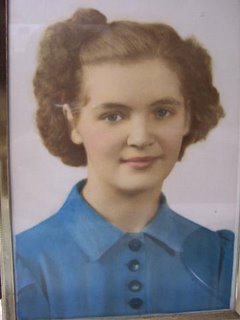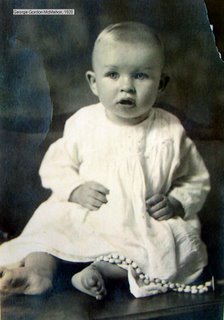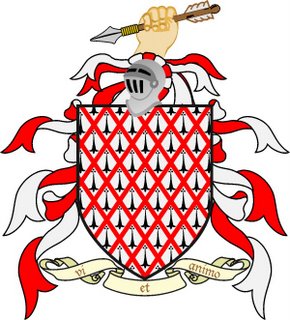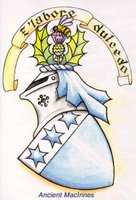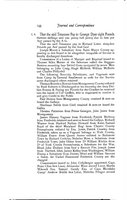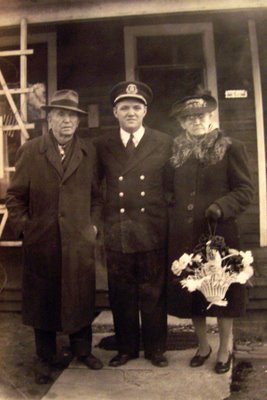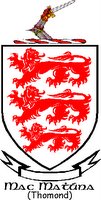as told by Cal Biddle...
These are the generations of Isaiah Biddle, soldier, patriot, husband, father, gospel minister. We do have copies of some of his sermons, but I have not found a photograph of him. Isaiah Biddle's father was Andrew.
Isaiah served in the Civil War on the side of the North. His enlistment papers described him as 5'5" with blue eyes and brown hair. He was a sargeant in Company A of the 5th Maryland Volunteers. He married Sarah Catherine Pearse on July 4, 1866, in Northeast, Cecil Co., Maryland. He became a minister and died in 1919. My father knew him, his grandfather, and he heard him talk about the war. Dad said that he always told him the reason he never got shot was because he was short enough to hide behind any rock or log. His wife died in 1938.
They had thirteen children. Four died in infancy. They were named Herman Biddle, Clarence Biddle, Nora Virginia Biddle, and Beatrice Biddle. I don't have a listing of what order any these children were born. The ones who lived to adulthood are as follows.
1. Charles Edward Biddle married Beatrice Simpers. They adopted a son Charles.
2. Sara Elizabeth Biddle married Harry Perkins. They had one son, Lawrence Perkins. After Harry's death she married a Mr. Abrams. There were no known children of this marriage.
3. Walter Earnest Biddle (the third child and my grandfather) was born May 8, 1872. He married Deborah Alexander, and they had nine children. He worked as a potter his entire life. Here are the children of this marriage:
a. Edith May Biddle born August 13, 1893. Married Thomas Hitchcock. They had several children, but she was killed by a drunk driver who ran a stop sign on September 5, 1933.
b. Walter Frederick Biddle, born August 10, 1896. He married Ester. Ester died just last year, 2005. We and Dad visited her just after he moved to live with us. They never had any children. They lived in Peoria, IL. He served in World War I and played some semi professional baseball before the war. He worked for the Catepillar Tractor company most of his adult life.
c. Helen Biddle born January 11, 1900. She married and had several girls. Dad lost track of the girls.
Carroll Lincoln Biddle born may 25, 1902. Married and had two girls who we still have some contact with. He worked his entire life for the Sun Oil Co. at a refinery. Sunoco. He lived in Wilmington, Delaware. He and Dad were probably the closest especially after he led him to the Lord. They used to fish together guite a bit on the Chesapeak Bay. Died May 30, 1980.
d. Hayes Herman Biddle born March 1, 1905. He married, but they never had any children. He was a plant manager in Cleveland, OH. They retired to Northeast where he died on May 29, 1986. As kids he and Dad did many things together especially in an old row boat they "borrowed" to gather coal, go hunting or fishing.
f. Ruth Janey Biddle were born July 22, 1907. She married and had two sons who both survive. Richard and David are both older than Al. We remain in contact with them.
g. Eunice Biddle born March 12, 1911. Died just a couple years ago. One son is retired and lives in Florida. They travel around the country in a big RV. His daughter teaches at Miami University in Ohio.
h. Doris Virginia Biddle was born on January 4, 1904. She is the only sibling still living. She married Robert White who is deceased. They had two children. The oldest lives in California. The youngest Robert White Jr. is still single and travels extensively. Doris lives in a retirement high rise in Sandusky, Ohio. She is a faithful member of the First Baptist Church. Since Dad bought her first violin, she offered to anyone in our family her more than three hundred year old violin with the stipulation that it go to someone who would faithfully play it. I knew of no one who was taking up the violin among our clan so she donated it to Oberlin College. It was valued at $18,000. She road to church when she was 90 on the back of a motorcycle. She says Ray lived to be 94, and he lived the longest. She doesn't expect to live any longer than the next two years.
4. Andrew Nelson Biddle married Lida Parks. They had no children.
5. Maggie Biddle married Charles Stewart. They had one son, Harold.
6. John Alford Wilson Biddle married ? They had two girls, Emily and Mildred.
7. Ethel Miller Biddle never married. She lived in the old home place in Northeast until she died at the age of 103. I met her while I was in junior high school when my parents went back to Northeast. I was in Great Grandfather Isaiah's house for about an hour on a hot summer day. The things I remember was that Ethel had on a long dress, about ankle length, even though there was no fan and no air conditioning. The house badly needed painting. It looked like it had been whitewashed at one time, but most had faded away. She offered us a cold glass of lemonade which was actually only slightly colder than lukewarm. The electrical wiring had been surface mounted and was minimal. She didn't have a television but there was a console radio. She had a good size vegetable garden for a single elderly lady. I remember wide wooden steps coming up to a large front porch. The front door stood open with a screen door to keep out the bugs. The house was two stories tall, but I never made it past the front room and the back kitchen. Later that day we met another great uncle painting a mast on a sail boat at the harbor. Dad said he was in his nineties, and he was about twenty plus feet up in the air on a little bench with a pully mechanism painting on someone's boat. I don't remember the name, and he never came down to greet us. He just said hello to Dad and kept painting. We did go to see Isaiah's grave. There was a small stone with a veteran's marker and flag.
8. Harry Marshall Biddle married Helen Dunlap. They had four children, Blanche, Marshall, Hilda, Ethel. Marshall never had any boys.
9. Clarence Isaiah Biddle married Mary Norman. They had two girls. He served in the U.S. Navy in World War I and died in 1919 or 1920 some say from diesease contracted during the war.
Dad told me while he lived with us that in 1917 he along with millions of others in this country contracted the flu. More people died that year in the United States than died in the war. There wasn't much medical care, and he doesn't know how sick he really was. However, he did hear the doctor tell his mother he didn't know if he would make it. He did, and you made it here too.




